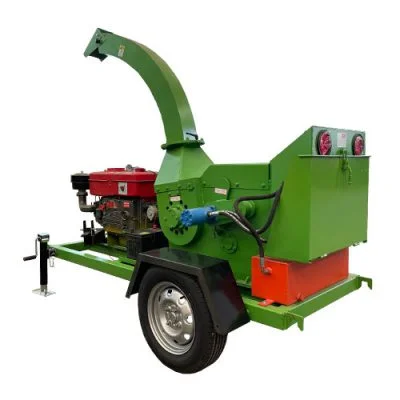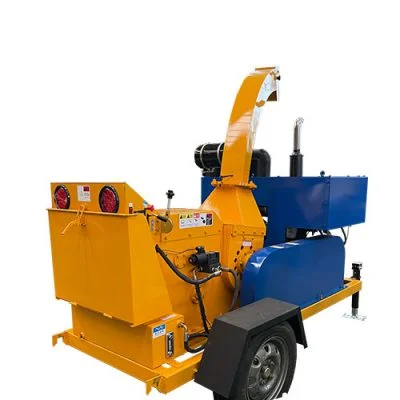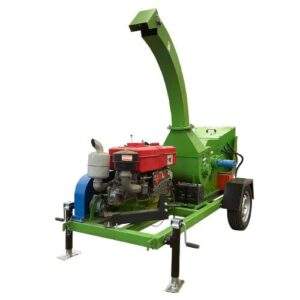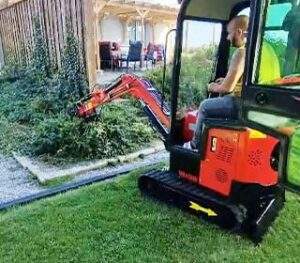The Benefits of Investing in a Commercial Wood Chipper
Introduction

In the realm of landscaping and forestry management, the commercial wood chipper stands as a crucial tool for efficiency and sustainability. This article delves into the various benefits of investing in a commercial wood chipper, exploring its practical applications, economic advantages, and environmental impact.
Understanding Commercial Wood Chippers
What is a Commercial Wood Chipper?
A commercial wood chipper is a powerful machine designed to efficiently process large volumes of wood into smaller, manageable chips. It consists of a hopper, a mechanism for feeding wood into the chipper, and a shredding or chipping mechanism that breaks down the wood into pieces. These machines vary in size and capacity, from portable units suitable for small-scale operations to industrial-sized models used in forestry and landscaping.
Types of Commercial Wood Chippers
Commercial wood chippers are typically categorized into drum chippers and disc chippers, each offering distinct advantages based on the specific application:
Drum Chippers: These chippers operate at a slower speed but with high torque, making them ideal for processing wood up to 18 inches in diameter. They produce uniform chips that are consistent in size, which is beneficial for applications such as landscaping and biomass fuel production.
Disc Chippers: Disc chippers feature a high-speed disc that rotates to cut and chip wood efficiently. They are commonly used in large-scale operations where high throughput and versatility are crucial. Disc chippers can handle various types of wood and are preferred for their ability to process large volumes quickly.
Key Benefits of Investing in a Commercial Wood Chipper
Cost Savings
Investing in a commercial wood chipper can lead to significant cost savings for businesses involved in landscaping, forestry, and agriculture. By processing wood on-site, companies can reduce disposal fees associated with transporting wood waste to landfills or recycling centers. Moreover, wood chips produced by the chipper can be sold as biomass fuel or used as raw material for landscaping projects, generating additional revenue streams.
Operational Efficiency
Commercial wood chippers streamline operations by automating the process of wood waste management. Instead of manually handling and disposing of large volumes of wood, operators can feed branches, limbs, and tree trunks directly into the chipper, saving time and labor costs.
Waste Reduction
One of the primary environmental benefits of commercial wood chippers is their ability to reduce wood waste. Rather than allowing wood debris to decompose in landfills, where it contributes to methane emissions, wood chippers convert this waste into valuable wood chips. These chips can be used for various purposes, including mulching, erosion control, and composting.
Carbon Footprint Reduction
Commercial wood chippers promote sustainability by supporting practices that reduce carbon emissions. Wood chips can be used as a renewable biomass fuel source, replacing fossil fuels in heating and energy generation. As biomass, wood chips are considered carbon-neutral because the carbon dioxide emitted during combustion is offset by the carbon dioxide absorbed by trees during growth.
Practical Applications of Commercial Wood Chippers
Landscaping
In landscaping, wood chips produced by commercial wood chippers are used as mulch to improve soil health and moisture retention. Mulching with wood chips suppresses weed growth, regulates soil temperature, and enhances the aesthetic appeal of gardens and parks. Landscapers also use wood chips for pathways, playground surfaces, and decorative landscaping features.
Forestry Management
Commercial wood chippers play a vital role in forestry management by facilitating the removal of tree debris, branches, and underbrush. This debris can accumulate during forest thinning, wildfire prevention, or storm damage cleanup. By chipping this material on-site, forestry professionals can maintain forest health, reduce the risk of wildfires, and improve overall land productivity.
Case Studies and Success Stories
Case Study : Municipal Landscaping Services
A municipal landscaping service integrated a commercial wood chipper into its operations to improve efficiency and reduce operational costs. By chipping tree trimmings and branch debris on-site, the service minimized transportation costs and landfill fees, while also providing residents with free wood chips for mulching.
Case Study : Forestry Company’s Sustainability Initiatives
A forestry company adopted commercial wood chippers as part of its sustainability initiatives to manage wood waste effectively. By converting logging residues into wood chips, the company reduced environmental impact, promoted sustainable forestry practices, and developed new revenue streams through biomass sales.
Comparison of Commercial Wood Chipper Types

| Type of Chipper | Features | Applications |
|---|---|---|
| Drum Chipper | Slow speed, high torque | Ideal for wood up to 18 inches in diameter, produces uniform chips |
| Disc Chipper | High-speed disc rotation | Suitable for large-scale operations, handles various wood types efficiently |
Conclusion
In conclusion, investing in a commercial wood chipper offers multifaceted benefits ranging from economic savings to environmental sustainability. By effectively managing wood waste and enhancing operational efficiency, businesses can achieve both financial success and contribute positively to environmental conservation efforts.
FAQ
Q:What safety measures should be considered when operating a commercial wood chipper?
A:Operating a commercial wood chipper requires strict adherence to safety protocols to prevent accidents and injuries. Operators should wear appropriate personal protective equipment (PPE), such as gloves, eye protection, and hearing protection. They should also receive thorough training on the safe operation of the chipper, including proper feeding techniques and emergency shutdown procedures.
Q:How do wood chippers contribute to sustainable practices?
A:Wood chippers contribute to sustainable practices by reducing wood waste and promoting the recycling of organic materials. By converting wood debris into useful wood chips, these machines support initiatives aimed at reducing greenhouse gas emissions and conserving natural resources.
Q:What maintenance is required for a commercial wood chipper to ensure optimal performance?
A:Regular maintenance is essential to ensure the optimal performance and longevity of a commercial wood chipper. Maintenance tasks include cleaning the chipper after each use to remove debris and inspecting components such as knives, blades, and belts for wear and tear. Additionally, lubrication of moving parts and periodic sharpening of cutting blades are necessary to maintain efficient chipping operations.



